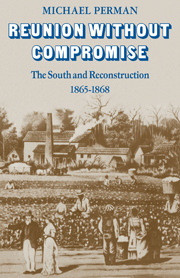Book contents
- Frontmatter
- Contents
- Preface
- Part I Conciliation and conflict
- Part 2 Encouraging Southern loyalty, 1865
- 2 The Provisional Governors
- 3 Strategies for readmission
- 4 Discretion decentralized
- 5 Misrepresentation
- Part 3 Seeking Southern cooperation, 1866
- Part 4 Demanding Southern acquiescence, 1867–1868
- Epilogue: The irrelevance of the moderates, 1865–1868
- Appendix: Registration and voting statistics for the Southern State Constitutional Conventions, 1867–8
- A note on sources
- Index
2 - The Provisional Governors
Published online by Cambridge University Press: 05 August 2012
- Frontmatter
- Contents
- Preface
- Part I Conciliation and conflict
- Part 2 Encouraging Southern loyalty, 1865
- 2 The Provisional Governors
- 3 Strategies for readmission
- 4 Discretion decentralized
- 5 Misrepresentation
- Part 3 Seeking Southern cooperation, 1866
- Part 4 Demanding Southern acquiescence, 1867–1868
- Epilogue: The irrelevance of the moderates, 1865–1868
- Appendix: Registration and voting statistics for the Southern State Constitutional Conventions, 1867–8
- A note on sources
- Index
Summary
In spite of the uproar caused in the North over the terms offered General Joseph E. Johnston by General Sherman, every one of the Confederacy's Governors embarked upon courses of action during the ensuing weeks which implied a total disregard for this furor and for the Northern feelings which had precipitated it. With the concurrence of the President and his Cabinet, Stanton, the Secretary of War, had issued a stinging rebuke to Sherman for concluding an agreement which was ‘a practical acknowledgement of Rebel Government.’ Yet, one by one, the Governors of the defeated Confederate States published proclamations calling their legislatures into session or else dispatched emissaries to Washington or to the General commanding in their State, to enquire if restoration could be commenced under the old dispensation. The Governors argued, as did Joseph E. Brown of Georgia in a telegram to the President on 7 May 1865, that ‘The complete collapse in the currency and the great destitution of Provisions among the poor makes it absolutely necessary that the legislature meet to supply this deficiency and with a view to the restoration of peace and order by accepting the result which the fortunes of war have imposed upon us.’
This recognition of the need for immediate governmental action towards restoring social order and relieving distress was not solely to demonstrate that the incumbent Southern officials would act responsibly if entrusted with a continued lease on political power.
- Type
- Chapter
- Information
- Reunion Without CompromiseThe South and Reconstruction: 1865–1868, pp. 57 - 67Publisher: Cambridge University PressPrint publication year: 1973



